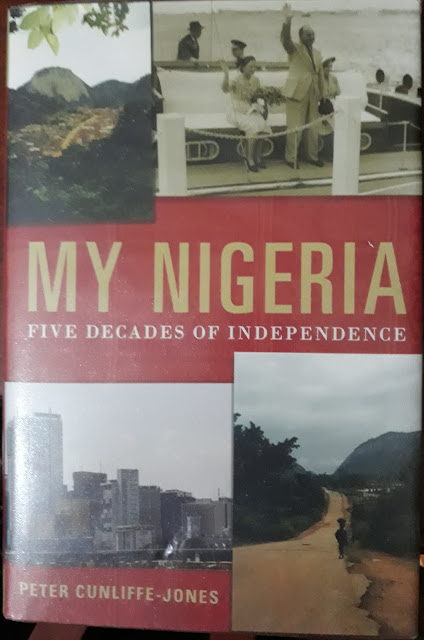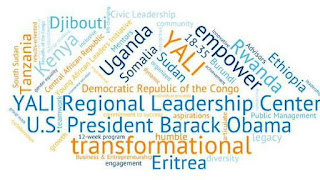Book Review: My Nigeria-Five Decades of Independence (by Peter Cunliffe-Jones)
Publisher: Palgrave Macmillan
First published: 2010
I have the rare privilege of knowing a few authors personally,
and realizing that not everybody has a daily access to these patient
hardworking minds that sit down for hours, thinking about words, and writing
them down to tell beautiful unforgettable stories. One of those authors is
Peter Cunliffe-Jones. We have sat down with him for lunch a few times. The first
time we met, it was over drinks in some Nairobi hotel. We spoke about fact-checking.
But that is another story, for another time.
I knew he wrote a book and when he speaks, in passing, about
the experience, you get the impression that it was one of those works where he
spent hours doing research, combing through his notes, talking to people,
asking uncomfortable questions, making conclusions and then doing the brave
thing: stringing a readable story and putting it out there.
His book My Nigeria: Five
Decades of Independence is one of those books that I read and could not put
down. I bought it off Amazon and it arrived just a week before I took my flight
from London to Nairobi. I packed it in my hand luggage because I was meant to
finish John Nixon’s Debriefing the
President (about the interrogation of Saddam Hussein and the Bush White
House) on the long flight. When I landed
in Nairobi I was done with Nixon’s book and I unpacked My Nigeria to read as I waited for my friend to pick me from the airport
that night.
It is a fantastic read, well-written, relatable if you are a
Kenyan or African for that matter, working and struggling to make ends meet. If
you are a Kenyan journalist reading My
Nigeria in 2018, you can’t help but notice the parallels between the two
countries, both colonial constructs, steeped in tribalism, with a corrupt
political elite that steals public funds and operates with jaw-dropping
impunity. My Nigeria is a personal
story, with extensive political history of a complex country, very optimistic
people, and you know, a resigned helplessness about the power of the masses to
change the state of the nation. He writes about things that even as a Kenyan, I
shudder when I see similarities between what his Nigeria story and what is
happening in my own country, today!
That he is a Brit, writing about Nigeria, with such deep
passion and insight that you can note his personal hurt at the state of that
country, was illuminating. Why would he care? I asked myself.
But that was before I read his personal stories of his Nigerian friends who had to flee abroad because their businesses had been impoverished by bribe-taking officials. You see his narration of being caught in the middle of a deadly, bloody ethnic clash witnessing the slaughter of young men, because of their tribe. You read about him sitting in a clinic in the Delta watching a child die of cerebral malaria. You hear about his friend who when flagged down by soldiers unthinkingly gives away some money, mourns and drives on. He doesn’t even speak to the soldiers. You read about how a thieving corrupt governor hinting forcefully that all that stolen wealth was his right because Nigerians don’t want a poor governor. You read about the multinationals; about superstition; and about how the people are so divided along ethnic and religious lines, even regional lines, that it is impossible for them to have a concerted effort to change things.
But that was before I read his personal stories of his Nigerian friends who had to flee abroad because their businesses had been impoverished by bribe-taking officials. You see his narration of being caught in the middle of a deadly, bloody ethnic clash witnessing the slaughter of young men, because of their tribe. You read about him sitting in a clinic in the Delta watching a child die of cerebral malaria. You hear about his friend who when flagged down by soldiers unthinkingly gives away some money, mourns and drives on. He doesn’t even speak to the soldiers. You read about how a thieving corrupt governor hinting forcefully that all that stolen wealth was his right because Nigerians don’t want a poor governor. You read about the multinationals; about superstition; and about how the people are so divided along ethnic and religious lines, even regional lines, that it is impossible for them to have a concerted effort to change things.
(THE LAW).
In some chapters, I got the sense that Peter was looking at the insane but practical decision for the colonial officers to merge the warring regions in Nigeria into one country as the original sin, the foundation for the corruption. But while he was inclined to blame the architect and the engineer for building a bad house with cracks in the foundation, his Nigerian friends are very clear in their thoughts that it is Nigerians to fix their country. I got the sense that he blamed colonialism for the problems in Nigeria. His grandfather, a senior colonial figure who was part of the team that wrote the Constitution long before independence noted in his diaries that “the outlook (was) bad”. It is something he struggled with and you can see it in the choice of words in Peter’s narration.
But blaming colonialism after five decades of Africans being
in power—even with the influence of multinationals and the foreign interference
in the politics and the support of foreign banks to hide the loot—is to
exonerate the legendary greed of the Nigerian elite. Or of the political elite
of the African dictators and their kleptocracies. It is very helpful that Peter
had to turn to Indonesia to illustrate this point, and to carefully point out
the similarities between Nigeria and Indonesia, and the unique circumstances
that show Nigeria the way it is, and Indonesia the way it is.
In the book, the history of Nigeria, the coups and the
counter-coups, the tribal animosity, the impunity, the corruption and the lack
of leadership are vividly illustrated with journalistic candor, with
bewildering anecdotes, complete with witnesses, it would surprise you that such
things can happen in a country. But I have seen some of the things written in
there happening right here in Kenya in 2018 and it scares me that the same “story
of a people reluctantly, but inevitably, acquiescing to misrule…” is alive in
my own country.
For example, you have stories of top politicians looting
millions from public firms, and building palatial homes, buying loyalty and if
push comes to shove, hiring hitmen to neutralize the inconvenient
whistleblowers. You get the sense that money buys power in that country, and
power makes money, lots of money. For any Kenyan, this sounds familiar. Remember
the case where a suspect told a parliamentary committee how she carried millions of taxpayers’
money?
It didn’t help that while I was reading Peter’s book and his
story about how a person going on holiday had to put up a ‘Beware of 419’ sign
to warn people that their house is not for sale, I read this story about how a dead
man’s land was just stolen in Kenya!
They keep on looting public money. Instead of changing the
quality of life of the people, they let the people die, and only act when their
hold on power is challenged. And that “action” is to either kill, buy
opponents, jail them, or do whatever they can to keep the power, but not to go
out and fix the lives of the people. At
some point, you can sense the trauma that all journalists who have counted the
bodies, or watched people being slaughtered in the choice of words. It awakened
some ghosts in me.
Kenya is a country where former fraudsters and looters of
public money are elected to high office, fools and political buccaneers
appointed ministers or are elected to high office. It kills me.
I have had to re-read Chinua Achebe’s The Trouble with Nigeria, and I had to mine Frédéric Bastiat’s The Law, just calm down. Peter’s book makes
me want to write about the theft in Kenya, the absence of “hygiene” in Kenya’s
politics, as PLO Lumumba calls it.
I was surprised that Peter wound up his book on an
optimistic note, that the Internet and the power of communication would change
Nigeria. Yes, nothing is impossible, because, when you hear that Africa’s
richest man Aliko Dangote, a Nigerian came to invest in Kenya and abandoned the
projects because of the greed in Kenya.
“I didn’t think Kenya would be more corrupt than Nigeria” he
reportedly
told Jeff Koinange, a Kenyan journalist who worked for CNN and was fired because of a story he did
on the Niger Delta in Nigeria.
Sheesh!
I wish I could go on and on and on, but I don’t want to be a
spoiler. Buy the book and read for yourselves. What a read. My Nigeria: Five Decades of Independence



Comments
Post a Comment